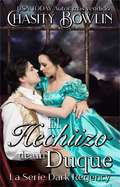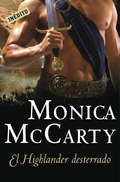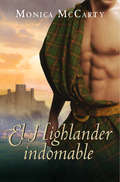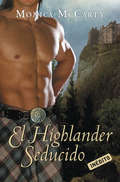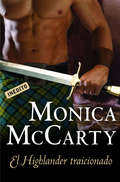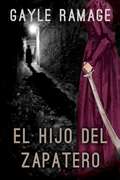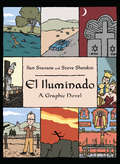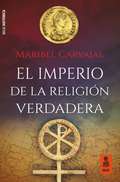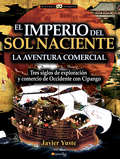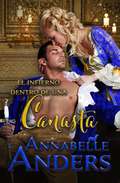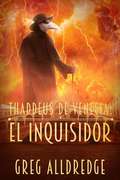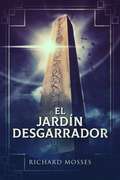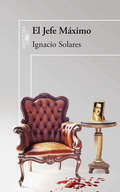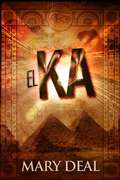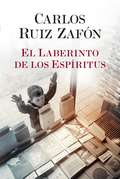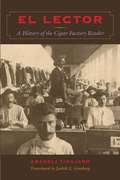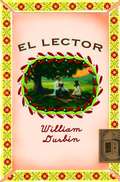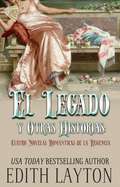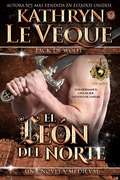- Table View
- List View
El Hechizo de un Duque (Serie Regencia Oscura/La Serie Dark Regency #1)
by Chasity BowlinComunicarse con los espíritus ha sido tanto un don como una maldición para Emme Walters. Ahora la ha convertido en el objetivo de un asesino. Emme sabe por qué la duquesa viuda de Briarleigh la invitó a una fiesta en casa para investigar si el duque Rhys Brammel asesinó a su esposa hace años. Pero Emme nunca imaginó que se enamoraría del duque. Marcado por la sociedad como un posible asesino, Rhys sospecha de Emme y su presunto "don." Entonces un encuentro nocturno crea conciencia de sus otros aspectos, más atractivos. Cuando la vida de Emme está amenazada, Rhys se convierte en su protector. Emme y Rhys encuentran pasión y peligro mientras unen fuerzas para resolver los misterios en Briarleigh. Ella le hizo creer en los espíritus, pero ¿puede hacerle creer en el amor?
El Highlander desterrado (Highlander #Volumen 2)
by Monica McCartyEl segundo libro de la trilogía de los Campbell Si arriesgan el corazón, pueden perder todo lo demás... Patrick MacGregor es un hombre que posee el espíritu duro y tenaz de quien pertenece a un clan proscrito. No se detendrá ante nada para salvar a su gente de la destrucción, aunque eso conlleve involucrar en un audaz engaño a Elizabeth Campbell, la hija de su peor enemigo. Tras una apariencia tímida y laboriosa, en ella pugna por salir a la luz una mujer dispuesta a amar, capaz -cuando un bello y misterioso guerrero la rescata de una emboscada- de invitarlo a quedarse a su lado. La dulzura de la doncella penetra en las frías profundidades del alma desolada de Patrick, y provoca en él sentimientos encontrados, muy superiores a la venganza que planea. Seducida por sus besos y embelesada por el peligro que lo rodea, Elizabeth sucumbe a la promesa que le lanza la mirada de este hombre atormentado y rebosante de misterio.
El Highlander indomable (Los MacLeods #Volumen 1)
by Monica McCartyLa pasión puede ser mucho más peligrosa que la venganza. Rory MacLeod es un poderoso jefe escocés que solo guarda lealtad a su clan. Odia profundamente a los MacDonald, aunque un pacto con este clan rival lo ha obligado a un matrimonio con Isabel MacDonald, una esposa que no desea ni tiene intención de mantener. Pero Rory no había previsto que esta fascinante mujer pondría a prueba su temple de hierro y desataría la pasión salvaje que hierve bajo su bárbara apariencia. Con el don de una belleza sin par, Isabel está dispuesta a emplear todos los medios a su alcance para descubrir los secretos más recónditos de su marido. Sin embargo, se sorprende cuando Rory despierta en ella ardientes fantasías. Ahora Isabel ha encontrado la felicidad con la que siempre había soñado... precisamente con el hombre al que debe traicionar.
El Highlander seducido (Los MacLeods #Volumen 3)
by Monica McCartyLos acecha una historia de amor inconfesable, salvajemente delicada... El cierre de la trilogía de «Los MacLeods». Lachlan MacLean haría todo lo que estuviera en su mano para proteger a su clan... incluso secuestrar a la mujer más perversa de toda Escocia con la intención secreta de proponerle matrimonio. Es un líder nato, tremendamente sensual, poseedor de una fuerza bruta insólita y un poder de mando formidable... pero no está preparado para la bella fiera que es Flora MacLeod, capaz de hacer peligrar todos y cada uno de sus planes. La de Flora es la mano más deseada de toda Escocia. Sin embargo, quiere evitar el destino que ya sufrió su madre, quien sirvió de simple moneda de cambio en un pacto entre clanes. Se jura a sí misma que su raptor se las pagará y se enzarza en una batalla psicológica donde nadie debería mostrar sus debilidades. Pero una pasión peligrosa puede endulzar el enfrentamiento en el momento menos pensado... cuando aparecen los fantasmas del pasado.
El Highlander traicionado (Highlander #Volumen 3)
by Monica McCartyEl cierre de la trilogía de los Campbell Es duro aprender qué pasa cuando se siguen los dictados del corazón... Duncan Campbell posee todos los atributos que corresponden a un jefe de clan escocés. Salvo uno: no es legítimo. Desterrado por un crimen que no cometió, se ha forjado en el continente una reputación de mercenario salvaje. Pero Duncan regresa a Escocia para limpiar su nombre y encontrar a la mujer que le traicionó pese a ser su amante. Sin embargo, poco después de sorprenderla mientras nada en un lago, termina encañonado por un arcabuz. A Jeannie Grant siempre le han dicho que es impulsiva como su madre, que por amor trajo la destrucción su clan. Jeannie nunca lo creyó hasta que conoció a Duncan Campbell. No era un marido adecuado para la hija de un poderoso caudillo, pero ella le dio su inocencia. Y él le falló. Tras tanto tiempo, el hombre al que ha disparado no se parece en nada al sinvergüenza de antaño. Pronto se destapará un secreto mortal, y no solo penderá de un hilo su amor perdido, sino sus propias vidas.
El Hijo Del Zapatero
by Gayle Ramage Natalia Magalí Prieto1807. Siendo todavía un pequeño, Brogan O'Malley se encuentra con la extraña y enigmática Darcy en las calles de Edimburgo. Diez años después, Brogan, convertido en ladrón de poca monta, la encuentra una vez más y se sorprende al notar que no ha envejecido ni un día.Transcurren otros diez años más, corre el año 1827 y la vida de Brogan ha empeorado. Está a punto de involucrarse con los inescrupulosos ladrones de cadáveres William Burke y William Hare, y la reaparición de la siempre joven Darcy llevará a Brogan a descubrir un secreto que cambiará su vida para siempre.
El Hombre Que No Besaba A Las Mujeres: La historia secreta de Hitler
by Marcela Gutiérrez Bravo Mohamed BouzitouneLa historia se desarrolla en dos diferentes momentos. Un joven psiquiatra es comisionado para revisar y analizar los registros de tres pacientes; dos mujeres y un hombre con una extraña y extraordinaria historia. Al avanzar en la lectura verás que su destino está ligado al de Adolfo Hitler, y en la historia se relata la historia del dictador y de los eventos que unieron a estos tres misteriosos personajes, luego junto al psiquiatra, descubrirás un inesperado final de la historia. La novela según HERA EDICIONES: La obra está escrita en primera persona, donde el autor narra internamente lo que sucede a todos sus personajes protagonistas, desarrollando su psique en profundidad, y enganchando al lector desde el primer minuto, quien tratará de descifrar quiénes son los tres personajes enigmáticos de los que el psiquiatra debe ocuparse. La novela está inspirada en libros míticos como MI AMIGO HITLER o VARSOVIA 1944, además de contar con un importante trabajo de documentación e investigación, tal como podrá descubrirse a lo largo de todas y cada una de sus páginas. La obra aborda todos los aspectos de un best seller: secretos, escándalos, terror, conflictos bélicos, un personaje carismático ( Adolf Hitler), una trama llena de misterio, amor, soledad, dolor, rechazo,arte, música, pintura, romance, sexo … Y todo ello amalgado con un estilo fresco, rápido y dinámico que atrapa al lector sin ninguna duda. El autor ha conseguido con maestría que la obra sea realmente interesante, ha abordado la trama y la subtrama con una sencillez digna de mencionar: ha conseguido contar grandes hechos con palabras justas y de una elegancia realmente extraordinaria, por consiguiente produce que lector se atrape con la historia para no soltarle hasta el final.
El Héroe de Eleanor: Navidad en la Ciudad - Libro 2 (Navidad en la Ciudad #2)
by Jill BarnettUn clásico cuento de amor Navideño situado en el cambio de siglo en la Ciudad de Nueva York por la renombrada autora de más vendidos del NY Times Jill Barnett, El Héroe de Eleanor es un tierno, enternecedor romance entre dos opuestos. Después de cuidar de su abuelo enfermo por años, Eleanor Austen se halla a sí misma sola cuando él fallece. Ella es forzada a mudarse a un apartamento en el último piso de un edificio que su abuelo le arrendaba a un ruidoso gimnasio, propiedad del afamado boxeador irlandés Conn Donoughue. Es así que durante un nevado y mágico Diciembre, dos personas solitarias simplemente podrían encontrar que tienen más en común de lo que ellos pensaban… Para lectores de Jude Deveraux y Julie Garwood.
El Iluminado: A Graphic Novel
by StavensWhen young Rolando Pérez falls to his death from a cliff outside Santa Fe, New Mexico, the mysteries immediately begin to accumulate. Was he pushed or did he jump? <P><P>What are the documents that Rolando was willing sacrifice himself to protect from his family, the police, and the Catholic Church? And what does a colorful concha pastry have to do with any of this? In the midst of the investigation, Professor Ilan Stavans arrives in Santa Fe to give a lecture about the area's long-buried Jewish history. He's looking forward to relaxing afterwards with an evening of opera, but his presentation on "crypto-Jews" attracts unexpected attention, and soon Ilan is drawn into a desperate race to find the long-lost documents that might hold the key to Rolando's death. Ilan's detective work leads him to taco joints, desert ranches, soaring cathedrals, and, finally, deep into the region's past, where he encounters another young man: Luis de Carvajal, aka "El Iluminado," a sixteenth-century religious dissenter. In a tale of martyrdom that eerily echoes Rolando's, Carvajal fled Spain for colonial Mexico at the height of the Spanish Inquisition, searching for his religious heritage--a hunt for which he, like Rolando, would pay the ultimate price. In El Iluminado, esteemed literary critic Ilan Stavans and author and illustrator Steve Sheinkin present a secret history of religion in the Americas, showing how thousands of European refugees have left a trail of ghostly footprints--and troves of mysteries--across the American Southwest.<P><P> <i>Advisory: Bookshare has learned that this book offers only partial accessibility. We have kept it in the collection because it is useful for some of our members. Benetech is actively working on projects to improve accessibility issues such as these.</i>
El Imperio de la religión verdadera
by Maribel CarvajalEn El Imperio de la religión verdadera, Maribel Carvajal imagina tramas laberínticas que recrean la pulsión de un mundo en crisis que cambiará para siempre. Es el siglo IV de nuestra era y el edicto de Tesalónica conduce a Augusta Emerita, capital de la diócesis de Hispania, al abismo: la lucha por el poder entre paganos y católicos, una muerte en extrañas circunstancias, tesoros esquivos, un anacoreta que levanta los cimientos de la Iglesia hispana y una historia de amor prohibida sacuden las estructuras sociales y amenazan la convivencia más allá de sus murallas. La elaborada atmósfera histórica muestra los conflictos que dividen a los súbditos del Imperio, la apuesta de los emperadores por el cristianismo, las leyes que derogarán el paganismo, la amenaza de los bárbaros y los conflictos internos que, a su vez, hacen peligrar a la Iglesia de Roma. Una magnífica novela sobre la tolerancia y la libertad, y un alegato contra los fanatismos que enfrentan a la humanidad.
El Imperio del Sol Naciente (Historia Incógnita)
by Javier Yuste GonzálezTres siglos de exploración y comercio de Cipango con Occidente. 1542-1868: 300 años de contactos culturales y comerciales de Cipango con occidente: Desde el shogunato y la reunificación de Japón por Nobunaga, Toyotomi y Tokugawa hasta la restauración del poder imperial. Historias, aventuras, exploraciones y conflictos bélicos. La apasionante historia de la modernización del fascinante Japón.Conozca la narración apasionante de las historias, aventuras y desventuras protagonizadas por aquellos hombres que, zarpando desde puertos andaluces y lisboetas, desde Ámsterdam, Londres y otros tantos lugares, quisieron llegar hasta la mítica Cipango que Marco Polo describió en el s. XIII; unas islas pobladas por los hombres del Oriente dotados de un nivel culturals superior y rodeados de riquezas tales que solo el sol podría haber creado. Una obra que recoge de forma exhaustiva más de tres siglos de contactos culturales y mercantiles, con sus sombras y sus luces, con abrazos fraternales y odios exacerbados. Una etapa clave de la humanidad, en plena conquista y descubrimiento de todas las tierras ocultas; de afán por saber qué se ocultaba en aquellos espacios en blanco que poblaban los mapas, en los que tan solo se leía la leyenda de Terra Incognita y sinuosos dragones se coronaban como únicos reyes y señores. Si se atreve a pasar de la primera página, se verá trasladado a 1542 a bordo de un junco chino junto a Fernán Mendes Pinto, así como, a bordo de un moderno navío de guerra americano en 1853. Y, entre tanto, presenciaremos el buen entendimiento entre japoneses y españoles, hasta que este salte en miles de pedazos bañados en sangre, que sirve de tinta para un mensaje de advertencia dirigido al rey Felipe IV. Más que historia es la aventura en pos de conocer nuestros vínculos originales con una tierra que, aún a día de hoy, sigue sorprendiéndonos.
El Inca
by Alberto Vázquez-FigueroaEl Inca, el emperador que domina a sus súbditos desde la cima del mundo, el semidiós hijo del Sol necesita, cada vez, engendrar un hijo y una hija que, al casarse entre sí, garanticen la perptuidad de su carácter divino. La impureza de la sangre en el trono del Inca no es algo tolerable. Ningún advenedizo puede aspirar al trono. Pero Rusti Cayambe, capitán de diez mil hombres, y Sangay Chimé, princesa, intentarán alterar el curso de los tiempos a riesgo de sus vidas. Alberto Vázquez-Figueroa ha escrito una apasionante novela llena de ternura, tensión y aventuras que nos permite adentrarnos en un universo singular del que lo desconocemos casi todo.
El Inca
by Alberto Vázquez-FigueroaUna apasionante novela llena de ternura, tensión y aventuras que nos permite adentrarnos en un universo singular del que lo desconocemos casi todo. El Inca, el emperador que domina a sus súbditos desde la cima del mundo, el semidiós hijo del Sol necesita, cada vez, engendrar un hijo y una hija que, al casarse entre sí, garanticen la perptuidad de su carácter divino. La impureza de la sangre en el trono del Inca no es algo tolerable. Ningún advenedizo puede aspirar al trono. Pero Rusti Cayambe, capitán de diez mil hombres, y Sangay Chimé, princesa, intentarán alterar el curso de los tiempos a riesgo de sus vidas.
El Infierno Dentro de Una Canasta (Las Debutantes Malvadas Volumen II #1)
by Annabelle Anders¡Sophia Babineaux ha obtenido un marido! ¡Y uno bueno! Lord Harold, el segundo hijo de un duque, es amable, gentil, poco exigente. ¿Quizás demasiado poco exigente? Porque después de una oportunidad de encontrarse con el experto calavera, Capitán Devlin Brooks, es deslumbrantemente obvio que algo se perdió entre Lord Harold y ella…pasión…ardor…chispas…bueno…todo. ¡Y el matrimonio es para siempre! ¿Le permitirán sus padres reconsiderarlo? Absolutamente no. Héroe de Guerra, Devlin Brookes, está listo para casarse y piensa que Sophia Babineaux podría ser la única. Un muy pequeño problema: está comprometida con su primo, Harold. Pero Devlin ¡conoce a su primo! Y maldición si Harold no ha sido forzado a este compromiso matrimonial por el Duque de Prescott, su padre. Prescott generalmente consigue lo que desea. Devlin, Sophia y Harold conspiran par impedir los deseos del duque pero fallan al no considerar unas cuantas consecuencias vítales e imprevistas. Una vez en movimiento, ¡Los problemas rápidamente se disparan fuera de control! Atrapados en la tragedia, arrepentimiento, y engaño el amor de Sophia y Devlin se convierte en algo contaminado. Si ellos no pueden hacer frente a sus elecciones puede que nunca encuentren el camino de regreso una vez embarcados en su viaje…hacia el infierno dentro de una canasta…
El Infierno No Tiene Furia (Las Debutantes Malvadas Volumen I #1)
by Annabelle AndersUn alelí para siempre… Miss Cecily Findlay profesa la etiqueta apropiada, baila el vals perfectamente, usa ropas de última moda, y es una belleza por su propio mérito. Aun así, ella nunca seria recibida por la sociedad si no fuera por su enorme dote…la cual ha atraído a Flavion Nottingham, un conde malcriado y lleno de títulos. Este así llamado caballero ha empobrecido su estado y ve a Cecily como la respuesta a todos sus problemas. Lo más cobarde de todo, es que a él no le importa si hace pedazos sus sueños mientras ejecuta su plan retorcido. El siempre dispuesto... Mr. Stephen Nottingham, empresario industrial exitoso, está de regreso en Inglaterra para salvar los (¡ejem!) activos de su primo, pero debe haber llegado demasiado tarde. La limpieza involucra establecer deudas masivas, descartar una amante pegajosa, y enfrentarse a más de un padre colérico. No obstante, nada de eso importa tanto como salvar a la hermosa Cecily. Una clase de amor para siempre...Cecily esta atrapada por Lord Kensington y Stephen está atrapado por su honor. “Felices para siempre” está colgando del balance. ¿El destino abrirá las puertas para su amor perdurable?
El Infierno de la Belleza: Annabelle Anders (Las Debutantes Malvadas III #1)
by Annabelle AndersHay un tiempo en la vida de una dama cuando ella necesita tomar los problemas en sus propias manos… Una picara confabuladora. Emily Goodnight, una mujer literata curiosamente inteligente – quien no puede ver nada sin sus malditos anteojos – está creciendo en el arte de entrometerse a otras alturas. ¿Porque dejar su futuro en las manos del destino cuando es perfectamente capaz de dirigirlo ella misma? Un calavera sin emociones El Conde de Blakely, el mas inalcanzable soltero de Londres, encuentra el proyecto de la Srta. Goodnight casi tan intrigante como las curvas escondidas por debajo de sus vestidos desaliñados. Seguro en su independencia, él se ha focalizado en una sola cosa: evadir las manipulaciones de su padre. Haciendo esto, irónicamente, falla en evadir las traviesas manipulaciones tácticas de Emily. ¡De veras! Es el infierno de la Belleza. Con lo que pasa con todas las trampas en los juegos de salón, las citas en armarios oscuros, y escapadas nocturnas a Gretna Green, las complicaciones crecen. Porque el destino tiene limites. Y cuando el amor llega y también llegan los secretos del pasado, hay sólo demasiado camino tortuoso para que una señorita Inglesa pueda escapar…
El Inquisidor (Thaddeus de Venecia #1)
by Greg AlldredgeSólo intérpretes en un escenario. Thaddeus había logrado abrirse camino hasta la cima de su profesión. Como inquisidor del Dux, disfrutaba de todas las comodidades que ofrecía la Venecia de clase media. Todo ello, hasta que le es asignado un llorón escriba de Padua, Geovanni. Desde entonces su vida da un giro hacia lo incierto. Siéndoles encomendada la tarea imposible de descubrir el origen de una extraña epidemia, el inquisidor y el escriba son desterrados de Venecia hasta que encuentren una solución. Extraños elementos acechan en la zona, y no son los turcos. La primera tarea de ambos funcionarios es llegar intactos a la ciudad de Udine, asolada por la peste. ¿Serán capaces de encontrar la fuente y regresar? ¿Sobrevivirán? Lee el primer libro El Inquisidor, de la trilogía Thaddeus de Venecia, para averiguarlo.
El Jardín Desgarrador
by Richard MossesHuérfano después de que su familia muere en un accidente, el joven Sek huye de su abusivo hogar de acogida. Después de conocer a The Alston Street Irregulars, un grupo de fugitivos y refugiados que viven debajo de la Estación Central, cosas extrañas comienzan a suceder. Sek se entera de la Mujer Llorando: una fuerza espectral que lo atormenta como una sombra. Sek solo quiere ser libre, pero cuando escapa a las calles de Glasgow, la mujer llora lo sigue a todas partes. Finalmente, su desesperación lo lleva hacia el misterioso Adocentyn, donde Sek finalmente puede encontrar la redención. Pero para escapar del infierno, ¿tendrá que destruir el cielo?
El Jefe Máximo
by Ignacio Solares¿No era la vida una representación dramática que de pronto se volvía farsa? Hacia el final de su vida, completamente solo, Plutarco Elías Calles busca un consuelo, descubrir un trozo de verdad que le permita morir en paz, aunque lo espere un espantoso purgatorio... Ignacio Solares nos permite asomarnos a momentos cruciales en la historia de México, especialmente al regreso de Plutarco Elías Calles al país en 1941, cuando enfrenta el remordimiento y la soledad desde la práctica del espiritismo. Hacia el final de su vida, Plutarco Elías Calles tendrá que confrontarse con cada una de las personas a las que mandó matar: Francisco Serrano, el padre Agustín Pro, Álvaro Obregón... Cualquier horror es preferible a la Nada, la disolución total, en la que, por alguna extraña razón, Elías Calles nunca había podido creer, y ahora, luego de volverse asiduo asistente a sesiones espiritistas, ha vislumbrado otro mundo y es continuamente visitado por fantasmas. Otros autores han opinado: "El principal mérito de Solares como narrador es convertir a sus personajes en seres que nos reflejan y retratan nuestras miserias y grandezas." -Vicente Quirarte-
El Ka
by Mary DealLa estudiante de arqueología Chione tiene sueños vívidos sobre el descubrimiento de una tumba opulenta. Después de que el fundador del Instituto de Arqueología se entera de que los sueños de Chione podrían estar relacionados con eventos en Egipto, acepta una oferta para examinar un sitio misterioso en el Valle de las Reinas. Cuando descubren una cámara funeraria, antiguos hechizos transportan a Chione y a su ex novio, el arqueólogo Aaron Ashby, a 3.500 años en el pasado. Allí, aprenden sobre Tutankhamon y Tauret, una sacerdotisa en la corte del faraón. Pronto, Chione y Aaron descubren que han sido elegidos para desempeñar un papel crucial en el plan de Tauret.
El Laberinto de los Espiritus (El\cementerio De Los Libros Olvidados Ser. #4)
by Carlos Ruiz ZafónEl Laberinto de los Espíritus es un relato electrizante de pasiones, intrigas y aventuras. A través de sus páginas llegaremos al gran final de la saga iniciada con La Sombra del Viento, que alcanza aquí toda su intensidad y calado, a la vez que dibuja un gran homenaje al mundo de los libros, al arte de narrar historias y al vínculo mágico entre la literatura y la vida. En la Barcelona de finales de los años 50, Daniel Sempere ya no es aquel niño que descubrió un libro que habría de cambiarle la vida entre los pasadizos del Cementerio de los Libros Olvidados. El misterio de la muerte de su madre Isabella ha abierto un abismo en su alma del que su esposa Bea y su fiel amigo Fermín intentan salvarle. Justo cuando Daniel cree que está a un paso de resolver el enigma, una conjura mucho más profunda y oscura de lo que nunca podría haber imaginado despliega su red desde las entrañas del Régimen. Es entonces cuando aparece Alicia Gris, un alma nacida de las sombras de laguerra, para conducirlos al corazón de las tinieblas y desvelar la historia secreta de la familia aunque a un terrible precio.
El Lector
by Araceli TinajeroThe practice of reading aloud has a long history, and the tradition still survives in Cuba as a hard-won right deeply embedded in cigar factory workers’ culture. In El Lector, Araceli Tinajero deftly traces the evolution of the reader from nineteenth-century Cuba to the present and its eventual dissemination to Tampa, Key West, Puerto Rico, and Mexico. In interviews with present-day and retired readers, she records testimonies that otherwise would have been lost forever, creating a valuable archive for future historians. Through a close examination of journals, newspapers, and personal interviews, Tinajero relates how the reading was organized, how the readers and readings were selected, and how the process affected the relationship between workers and factory owners. Because of the reader, cigar factory workers were far more cultured and in touch with the political currents of the day than other workers. But it was not only the reading material, which provided political and literary information that yielded self-education, that influenced the workers; the act of being read to increased the discipline and timing of the artisan’s job.
El Lector
by William DurbinThirteen-year-old Bella wants to be a lector just like her grandfather. All day long he sits on a special platform in the cigar factory in Ybor City, Florida, reading books, newspapers, and current events to workers as they roll the cigars. Lectors have always been highly respected members of their Cuban American community. But now times are changing. When the factory workers clash with the owners, violence erupts and the lectors start losing their jobs. And then there’s the radio. Could this small device replace the lector? It’s up to Bella to determine her future and help her people preserve their history. From the Hardcover edition.
El Legado y Otras Historias
by Edith LaytonPublicadas previamente de forma individual, estas cuatro grandes novelas se recopilan en un solo libro por primera vez. “El Legado”: Vaalerian Blackwood es convocado a la finca de su anciano tío para ayudar al anciano a resolver un problema con su heredero. Lo que Valerian encuentra es un misterio y el amor de su vida. Solo tiene que decidir qué es más importante para él: resolver el misterio o conquistar a su dama. “Tesoro enterrado”: ¿Qué piensa Hannah Jenkins del hombre salvajemente atractivo y de lengua plateada que los aldeanos llevan a la casa de su familia después de que lo encuentran herido en la costa cerca de su casa en la costa? Dice que fue víctima de piratas. Pero, ¿quién es el pirata y quién es la presa? “Algo azul”: el próximo día de la boda de June Heywood se ve empañado por un comentario cruel que ella escucha, lo que la hace preguntarse por qué el apuesto e inteligente Lawrence, Lord Morrow, alguna vez pidió su mano. ¿A quién debería creer? ¿Chismes o su corazón? “Un matrimonio de mentes verdaderas”: la hermana de la novia y el hermano del novio, de temperamento similar, se entrelazan, mientras se pierden lo que sus parientes pueden ver tan claramente.
El León del Norte
by Kathryn Le VequeEl León del Norte (Pack De Wolfe ) por Kathryn Le Veque Dos hermanos, Una muje, Un voto de sangre 1461 A.D. - Dos hermanos y los mejores amigos. Uno es traicionado y asesinado en la Batalla de Towton por hombres que supuestamente eran sus aliados. El hermano superviviente , Sir Atticus de Wolfe, promete vengar la muerte de su hermano. El León de Northumbria, hereda el legado de los de Wolfe, está ahora desatado y busca venganza. Nadie está a salvo hasta que la deuda de sangre sea pagada. Pero también queda por resolver el asunto de la viuda de su hermano., Lady Isabeau de Shera de Wolfe. ¿La venganza de Atticus se interprondrá en la búsqueda del amor con la viuda sexy y dulce de su hermano? Descubre el verdadero significado del poder del amor en esta gran aventura histórica de traición, passión y venganza.
